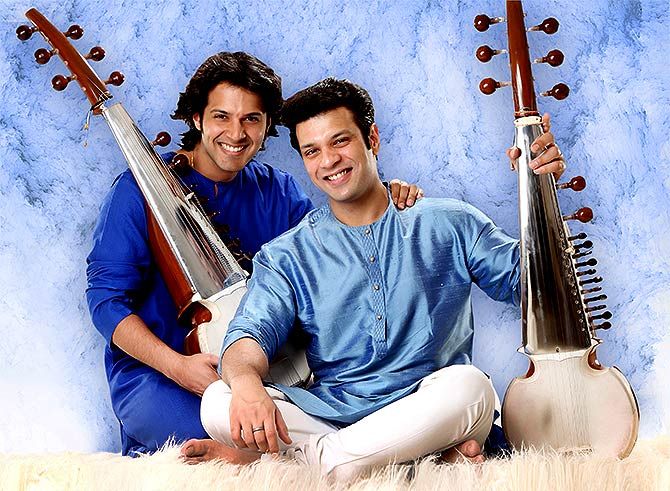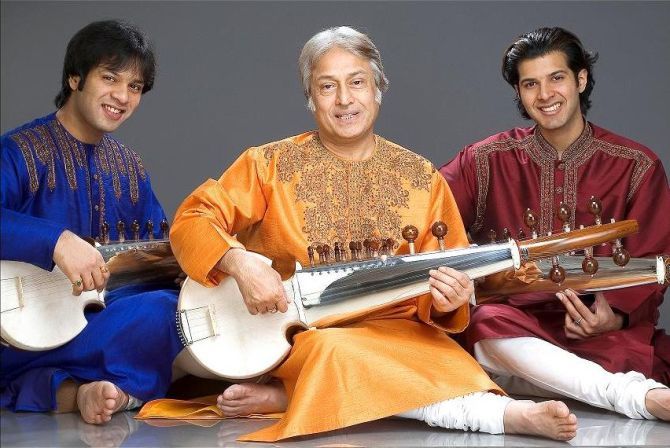Amaan Ali Bangash and Ayaan Ali Bangash are waiting to take their creation, the Erod, to the world, says Aditi Divekar.

You have consciously stayed away from the current fusion music frenzy. Being into pure classical music, what are the kind of experiments you are doing to bring something new to the table?
Amaan: We have been playing only classical music, but our performances range from international festivals like WOMAD to the Sawai Gandharva Bhimsen Mahotsav.
Even if I do fusion, my whole idea is to be organic, whether with Western classical or with folk instruments like the rabab.
The sarod is a very organic instrument and does not have too much noise.
I do not enjoy noise or loudness. Music should be soothing.
Ayaan: Both of us were clear that even when we did experimental work, we wanted to be classical musicians.
We started experimenting only from 2005 with albums like Reincarnation.
We did thematic music, hotel over-head music and also music for fashion shows.
We performed with several orchestras, national as well as international, but these are only facets of our creativity.
It was actually very comforting to come back to the real world, to who we were -- our classical music.
It is important to know who you are and which direction you want to walk towards.
It is okay to take different routes as long as you know your destination.
We have been conscious about not diluting the purity of our music. Our experimental work, too, has been raga-centric.
How easy -- or difficult -- is it to be the sons of Ustad Amjad Ali Khan. Is it difficult to carve a place for yourself in the industry?
Amaan: It is a blessing to be born to such a legend.
The idea is to not get bigger than him; the idea is to preserve what he has created.
First, you have to start with gratitude and not 'I deserve it.'
After that comes the opportunity you have got over others; you have to value it and work hard.
My only fear is that I should not be the reason for Abba's embarrassment.
I do have a lot of arguments with my parents, but my aim in life is to do what makes them happy, whether it is in music or marriage.
Criticism, according to me, is the biggest award.
When that happens, it means people are expecting something from you and that will only make you better.
When I am praised, I discard it.
Abba's seniority will keep getting bigger and the best part is that we are compared to the best.
The day you are compared to your teacher, half your battle is won. It is such an honour.
My father says, 'Keep going and one day you will carve a niche for yourself.'
Ayaan: Responsibility and family pride is something that is within and there is no formula or rule book to it.
Even if there is pressure, it would only mean you practise more, which is a good thing.
Even today we work hard before every concert. It is still like the first concert of your life.
By the time we were aware of what was happening around us, we were already strumming a sarod.
Are you open to doing music for cinema -- Hindi or regional?
Amaan: We have been open to it for a long time, but no one has approached us so far.
I feel when they need to, they will ask us.
Ayaan: At the end of the day, it is up to the film director to decide what he wants.
We have done background scores for English movies. We are open to regional cinema as well.
Amazing work is happening in Maharashtra and West Bengal.

Tell me something about the Erod. I have never seen you take the instrument to concerts.
Amaan: You are right. We played it only once at Blue Frog (a concert venue in Mumbai).
Somewhere, I am still very sacred to let go of my image as an Indian classical musician.
I had created the Erod for fun.
I wanted to use that instrument in perhaps concerts like NH-4, but I am not being offered those kind of concerts at the moment.
You can play these electronic sounds only in such concerts. These are big sounds. We are waiting for a big opening.
Ayaan: Even if we do play the Erod at concerts, it will be a one-off.
Our main instrument remains the traditional sarod.
I am not very keen on the Erod.
We have done a piece of Erod and sarod together and that had sounded very nice.
Any plans of doing a reality show, maybe as hosts, or even guests? You did Saregama almost two decades ago?
Amaan: I want to do something for youngsters.
I believe in these shows for there is an opportunity there, but I don't believe in the aftermath of these shows.
The concept to hunt talent and give them a platform is good. But these shows fail to keep their promises.
I did like to both host and judge, and would love to do it again.
Ayaan: When we were doing Saregama, the television industry was not what it is today. It was just a talent show.
Post KBC (Kaun Banega Crorepati), the entire industry has changed.
You can end up being a seasonal mango through these reality shows, enjoy the good lifestyle of a performing artiste and then get dropped overnight.
This is detrimental.
But I agree that the talent brought to the stage is brilliant.
What do you do on days you are not with the sarod?
Amaan: Spend time with family.
I also like spending time playing tennis, being in the gym, listening to music and meeting friends.
In our profession, it is very important to unwind.
There is a lot of stress in music.
One is constantly learning and practising and is under a lot of pressure. It is not that easy.
Ayaan: We are on the road most of the time. So when we get the time, we spend it with our family.
We treasure those moments -- dropping the kids to school, getting them back.
When you are not working, your mind is creatively working and so ideas come to you.
It is here when I pen my thoughts down. I do sketch a bit as well, but it has been long now since I did that.
DON'T MISS the features in the RELATED LINKS BELOW...











